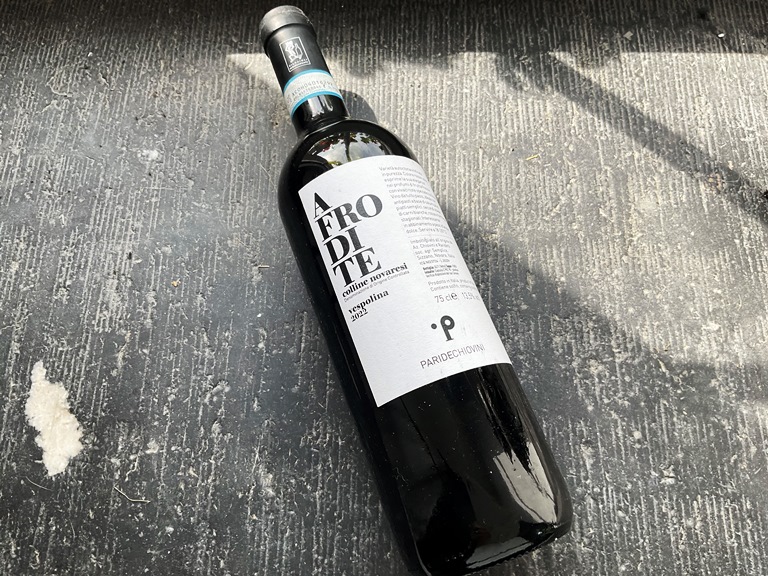What is an Uva Rara, Vespolina, Grignolino, Freisa, Verduno Pelaverga wine and what do these very local wines mean to the Flemish wine scene?
First, just to situate that before these wines find their way into the Flemish restaurant world I am sure they are already in the coffin. Flemish restaurants opt for the sure thing and go for a Chardonnay, Sauvignon, Barbera and Nebbiolo (Barolo and Barbaresco). Too bad, however, that they do not dare to take the leap into the unknown. It also requires sommeliers to have storytelling skills. My experience is that the education of sommeliers is really lacking in order to penetrate these noble unknown grapes into their brains. What can I teach you about these grapes/wines as a long-time presence in the Piedmontese wine scene?
Uva Rara - Region Alto Piemonte
Please don't translate literally. This is not a hugely rare grape. As a grape with 100% production in wine, it occurs with only Paride Chiovini. The other producers like Podere Ai Valloni use it e.g. in their BOCA production for very small quantities in their blend Nebbiolo - Vespolina - Uva Rara. Uva Rara is close to the Dolcetto D'Alba from Langhe region in terms of flavor profile.
Link Uva Rara by Paride Chiovini : UvaRara - Paride Chiovini
Link Uva Rara incorporated into blend organic production Boca by Podere ai Vallioni: Boca by Podere ai Valloni
Vespolina - Region Alto Piedmont
Those who love Verduno Pelaverga (note as appleation turned 30 this year) also love Grignolino (Monferrato) and Vespolina (Alto Piemonte). This pepper-like flavor really forms the label of the Vespolina wine. Those who were not producing Vespolina in purezza until last year have meanwhile already got their own Vespolina in the market (note: organically produced Vespolina Peperi from Podere ai Valloni). This wine goes particularly well with spicy cheeses.
Link Vespolina Paride Chiovini: Afrodite Vespolina by Paride Chiovini
Link Vespolina by Podere ai Valloni - organic winery: Vespolina Pepperi by organic winery Podere ai Valloni
Grignolino - Monferrato
There are two grignolino namely from Asti region and from Monferrato region. The Grignolino from Asti region comes from a sandy soil, the Grignolino from Monferrato comes from clayey soil. You do taste the difference in the glass. Casalone from Lu Monferrato - the wine we import from them - has two Grignolino. The basic young Grignolino and the Riserva. However many among our customers let us know that they are not "in" for the wood-aged Grignolino at all. Far too different from the taste the customer wants to experience.
Link Grignolino from Casalone: Grignolino La Caplëtta from Casalone
Freisa d'Asti and Freisa del Monferrato
Surely between the two Freisa lies a heavenly wide difference from the Freisa del Monferrato with more fans at our recent tasting April 26, 2025 in Mechelen. The Freisa d'Asti is grown on sandy soil while the Freisa Del Monferrato is situated on clayey soil. You can taste that in the glass and not a bit! Especially red fruit in both
Link to Freisa d'Asti from Ivaldi Dario- Freisa d'Asti from Ivaldi Dario
Link to Freisa del Monferrato by Casalone - Freisa del Monferrato - La Bricca - Casalone
Verduno Pelaverga - Langhe region
Its very light color raises the eyebrows of many a wine taster. And yet so many during one of our wine tours with private and professionals have gone before you and tasted the wine in the right setting, with the right cheeses, with the right accompanying salsas and found it good, result are the orders. However, it remains clear that we should only take one Verduno Pelaverga producer under our web shop because the question still remains laal for those who have not been onsite at the winery.
Link to Verduno Pelaverga from Cadia: Verduno Pelaverga of Cadia
And then the Wines for the "Safe Players", those who stick to Sauvignon, Merlot etc (international grape varieties) who are not open to new unknown territory
Piedmont Sauvignon from Massimo Abbate
Here we have two versions the Piedmont Sauvignon in purezza, i.e. 100% Sauvignon planted in Castagnole delle Lanze (near Neive) with production only 1400 bottles and the Bianco Musa (1400 bottles production) with 70% Moscato and 30% Sauvignon. The latter variety is said by customers to go incredibly well with sushi. I tasted it with pastries and there couldn't be a better bang for my buck
Link to Piedmont Sauvignon by Massimo Abbate : Piedmont Sauvignon - Massimo Abbate
Link to Bianco Musa : Bianco Musa - Massimo Abbate
Piedmont Riesling from Tenute Sella
All those who produce white wine in Alto Piemonte do so as plain Vino Bianco because in view of the court case in Piemonte against the Erbaluce di Caluso producers (located against Turin), which they lost by the way, the label may no longer show Erbaluce wine. However, we as a webshop cannot be charged if we do mention the word Erbaluce. Tenute Sella chose to go a different direction and instead of an Erbaluce grape 100% to go for Riesling with only very small dose of Erbaluce added.
Link to Riesling Tenute Sella: Piandora Riesling from Tenuta Sella
Langhe Rosso or Merlot 100% from Langhe
Yet another creation of the young but very ambitious wine producer from Castagnole delle Lanze, Massimo Abbate. As with his other wines only very limited production, here in the case of the Langhe Rosso 1,100 bottles. For those who know the Merlot grape - prerequisite of course - this will fit your palate perfectly. Massimo Abbate's total production across 7 wines is less than 10,000 bottles
Link to Langhe Rosso by Massimo Abbate - Merlot Langhe Rosso by Massimo Abbate





Comments
Login to give reaction Your comment will be posted as soon as it is approved.